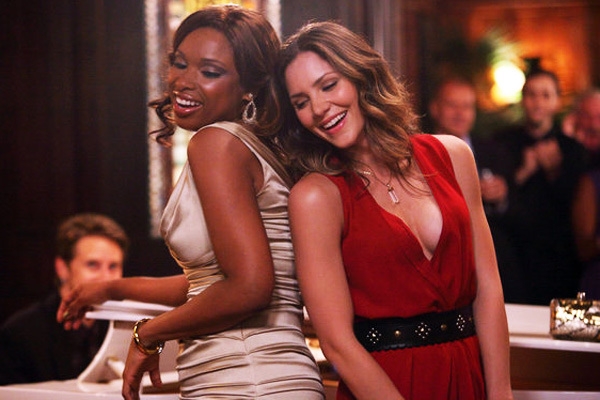Review: Ragtime in Concert
 |
| Ragtime concert director Stafford Arima with stars Norm Lewis, Lea Salonga, and Manoel Felciano |
There were many stars on the stage of Lincoln Center’s Avery
Fisher Hall during last night’s concert presentation of the Stephen
Flaherty-Lynn Ahrens-Terrance McNally musical Ragtime, but over the course of the evening it became clear that
the biggest star was the work itself. A
staggering masterpiece virtually unequalled by anything in the musical theatre
cannon, Ragtime juggles its
interweaving narratives with a breathtaking assurance that is a feat unto
itself, with the Flaherty/Ahrens score serving up an unending parade of some of
the most soul-stirring music ever composed for the Broadway stage. When the writers joined the cast onstage for
the final bow, the unassuming trio fittingly received a thunderous ovation
befitting a work of this magnitude.
Ragtime’s score
draws upon a host of distinctly American musical genres, all of which were
excellently rendered by the 36-piece orchestra under the baton of conductor
Sheilah Walker. Few musicals manage to
have the breadth and musical variety of Ragtime
while remaining a sonically coherent whole, but between Flaherty’s writing
and the orchestra’s excellent playing nary a note sounded out of place. In addition to the principals, many of whom
were past Tony winners, the ensemble was rounded out by veterans of various
other Ragtime productions and a hundred-strong
chorus which gave the sumptuous score with even more oomph than usual. The cast’s rendition of the sprawling opening
number was positively electric, as was their take on the soaring ballad “New
Music” and the triumphant final reprise of “Wheels of a Dream” that serves as
the show’s finale. But the truly
transcendent moment came during the Act I closer “Till We Reach That Day,” which
steadily built from a mournful solo sung by the sensational NaTasha Yvette
Williams into a roof-rattling crescendo with an emotional intensity that shook
the audience to its very core.
Among the principals, Tony-winner Lea Salonga made the
strongest impression with her gloriously sung and exceedingly well-acted Mother. After a somewhat tentative start which
perhaps stemmed from overplaying the character’s reserved nature, Salonga
steadily grew in confidence and intensity throughout the night to deliver a
stunning sucker-punch of a performance. By
the time she reached Mother’s big ballad “Back to Before” near the end of the
second act, Salonga’s command of the stage and inner strength fully enveloped
the cavernous hall, creating a genuine showstopper which was appropriately
greeted by rapturous applause.
As Tateh, a poor Jewish immigrant pursuing the American
dream, Manoel Felciano (Tobias in the John Doyle-helmed Sweeney Todd) brought tremendous warmth and a soothing tenor to his
many ballads, with his rendition of “Gliding” proving particularly moving. Felciano also shared a genuine chemistry with
Salonga that made their two duets (“Nothing Like the City” and “Our Children”)
immensely satisfying. The gifted actor
held everyone in rapt attention whenever he was onstage, and it’s a shame New
York audiences haven’t had more chances to appreciate this gifted actor’s many
talents.
Rounding out the show’s central trio was Norm Lewis as
Coalhouse Walker, Jr., the black piano player from Harlem struggling to rise
above the many indignities he faced at the hands of intolerant bigots. Lewis seemed less assured than Salonga and
Felciano, failing to fully convey Coalhouse’s quiet dignity and occasionally
struggling to meet the demands of Flaherty and Ahrens’ score. Despite these
problems he still managed to sell the rousing ballad “Make Them Hear You,” even
if the performance failed to fully eclipse the ghost of Brian Stokes Mitchell
in the original Broadway company.
Michael Arden did excellent work a Mother’s Younger Brother,
communicating the restless aimlessness of youth while using his piercing tenor
to effortlessly reach the back of the balcony.
As Father, Howard McGillin remained true to his character’s racist
tendencies while simultaneously showing Father’s softer side, thereby keeping
the character from descending into cartoonish villainy. Tyne Daly was a veritable force of nature as real-life
anarchist Emma Goldman, and young Lewis Grosso made for a charmingly precocious
Little Boy.
Unfortunately, there was one obvious weak link in the cast,
and that was the Sarah of Patina Miller.
Any actress tackling the role of Coalhouse’s doomed lover has the
unenviable task of living up to the memory of Audra McDonald’s legendary
Tony-winning performance, but even grading on a curve the Sister Act star failed to impress.
Her voice is ill-suited to the role, as the belting on which Miller’s
made her name is stylistically inappropriate to classically-influenced show,
and in attempting to avoid that trap she became too preoccupied to give a good
performance. “Your Daddy’s Son,” one of
the show’s most gut-wrenching songs, fell oddly flat when Miller sang it,
although the actress mostly regained control of the role after that initial
(and major) misstep.
As the inaugural production of Manhattan Concert
Productions’ Broadway Series, this Ragtime
has set an exceedingly high bar for any future installments. Hopefully the organization will continue
producing star-studded mountings of shows whose size and/or subject matter make
them risky commercial ventures but that don’t necessarily fit the obscure
Golden Age offerings City Center’s Encores! specializes in. Even with a few hiccups, the evening was a
resounding success, and yet another example of the unfettered brilliance of
Flaherty and Ahrens’ most famous work.

